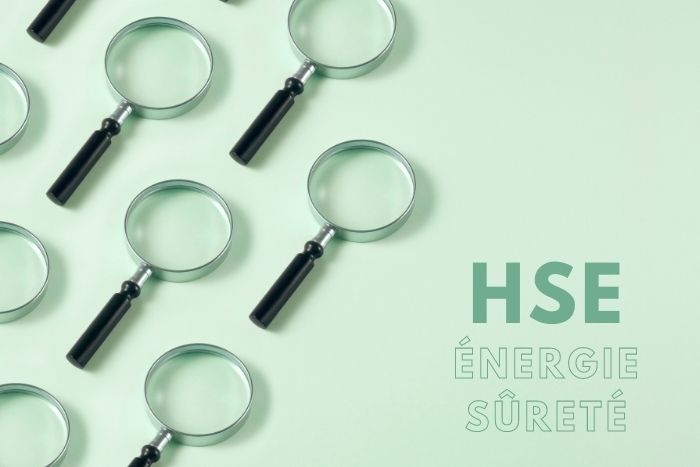We'd like to take a look at the main safety, environmental and energy regulations that came into force on January 1 of this year.
New environmental regulations
Lubrizol action plan
The aim of this plan is to reinforce regulatory provisions for the management and prevention of industrial accidents.
Some of the changes introduced by this plan came into force on January1. These include
- mandatory status of stored materials for all ICPE facilities subject to authorization
- new definition of heading 1510 (covered warehouses), broadening its scope of application.
Ban on plastic bottles
(French Environment Code Article L. 541-15-10)
The fight against single-use plastic is intensifying.
It is forbidden to distribute plastic beverage bottles free of charge on business premises and in establishments open to the public.
This prohibition does not apply to :
- establishments not served by a drinking water network,
- in the event of a public health emergency (e.g. heatwave, health crisis, etc.),
- or when a restriction on water intended for human consumption for food purposes is in force (e.g. tap water unfit for consumption).
Plastic waste exports from the EU
(Regulation no. 1013/2006 of June 14, 2006)
The export of plastic waste from the EU to non-member countries of the Organisation for Economic Co-operation and Development (OECD) is now prohibited. This ban does not apply to clean waste sent for recycling.
Waste collection in establishments open to the public (ERP)
(French Environment Code Article R. 541-61-2)
Operators of establishments open to the public (ERP) must organize the separate collection of waste generated by the public and their staff. To this end, they must provide separate collection systems:
- household packaging waste consisting mainly of plastic, steel, aluminum, paper or cardboard, as well as printed paper and graphic paper waste,
- and bio-waste.
This obligation applies to ERP producing more than 1,100 liters of waste, all waste combined, per week.
GHG allowances: a new period
(Regulation 2018/2066 of December 19, 2018, Code de l'environnement Articles R. 229-5 to D. 229-37-11 & Arrêté of December 21, 2020)
The European Union Emissions Trading Scheme (EU ETS) aims to reduce greenhouse gas (GHG) emissions.
It enters the4th period (2021-2030). This will restrict the allocation of free allowances to certain sectors.
Collection and declaration of TGAP waste to DGFIP
(Customs Code Articles 266 sexies to 266 quindecies)
Management and collection of the TGAP waste tax has been transferred from the General Directorate of Customs and Indirect Rights (DGDDI) to the General Directorate of Public Finances (DGFIP).
As a reminder, for the other components, this transfer took place on January1, 2020.
New energy regulations
Regulated electricity sales tariffs
(Energy Code Articles L. 337-3 to L. 337-9)
Regulated tariffs for the sale of electricity (TRVE) apply to consumers with a contract power of 36kVA or less.
They are now only available to certain non-domestic consumers. These must employ fewer than ten people and have annual sales, revenue or balance sheet total not exceeding €2 million.
Other consumers had to choose a market offer.
New safety regulations
Mandatory inspection plan when using a PTC
(Order of November 20, 2017)
By complying with a professional technical specification (CTP), you can take advantage of the appropriate periodicity for in-service monitoring of your pressure equipment (ESP)*.
Any operator wishing to take a PTC course must now implement an inspection plan.
He must be able to justify the conformity of this plan to the CTP.
The inspection plan defines the monitoring actions to be carried out to ensure that equipment undergoes a complete examination between commissioning and its first periodic requalification, and again between 2 periodic requalifications. It must be approved.
Example: The CTP Refrigeration Systems enables us to monitor pressurized refrigeration units.
*ESP examples: air compressors, steam boilers, pressurized chillers, etc.
New carcinogenic work
(Order of October 26, 2020)
Work involving exposure to respirable crystalline silica dust from work processes is added to the list of carcinogenic substances, mixtures and processes.
Consequently, the employers concerned will have to implement the provisions applicable to CMR chemical agents: annual control of VLEP, reinforced individual monitoring of employees' state of health, reinforced employee training, etc.
Dematerialized notification of the AT/MP rate decision
(French Social Security Code Article L. 242-5)
Since January 1, 2020, it has been compulsory for companies with more than 149 employees to notify the rates of contributions payable in respect of accidents at work and occupational illnesses (AT/MP).
It will become compulsory for companies with at least 10 employees from January 1, 2021.
These notifications are made via the "Compte AT/MP" teleservice available at www.net-entreprise.fr.
Subscription to this teleservice is therefore compulsory for all employers liable for this contribution, failing which penalties will be applied. The French health insurer specifies that companies with between 10 and 149 employees must register before December 1, 2020.
Adapting the TDG decree to new international agreements
(Order of May 29, 2009)
The TDG decree groups together the rules applicable to the transport of dangerous goods on national territory for the 3 land modes: road, rail and river. It has been adapted to take account of changes in international regulations on the transport of dangerous goods by land (ADR 2021, RID 2021 and ADN 2021).
The main changes concern the following points: online designation of the CSTMD, use of a trailer to transport fuels under certain conditions, exemptions for transport operations carried out by wholesaler-distributors of medicines, IBC deliveries of liquid hazardous materials, new UN number 3549 for certain infectious medical waste, etc.
Employers may continue to apply the old provisions of the TDG Order until June 30, 2021.
Blind spot warning on vehicles over 3.5 tonnes
(Highway Code Article R. 313-32-1)
Blind spot signage will become compulsory from January 1, 2021 on all vehicles with a gross vehicle weight (GVW) of over 3.5 tonnes. Failure to comply will result in a 4th class fine (€135).
An exemption is provided if an equivalent device complying with the regulations of another European Union country is present.
In addition, vehicles will benefit from a one-year transition period if they are fitted with another blind spot warning device on the sides and rear before March 31, 2021.
Mandatory AEDs in ERP categories 1 to 3
(Code de la construction et de l'habitation Articles R. 123-57 to R. 123-60 & Arrêtés du 29 octobre 2019)
An automated external defibrillator (AED) is now compulsory in category 4 public-access establishments.
This AED must be easily accessible and usable by any person. Its signage must comply with the decree of October 29, 2019.
In addition, the operator must declare his WEEE in the Géo'DAE national database.
Note: the installation of an AED has been compulsory since January 1, 2020 for category 1 to 3 ERP and January 1, 2022 for certain category 5 ERP (railway stations, high-altitude hotel-restaurants, mountain refuges, enclosed and covered sports facilities, etc.).
Conclusion
Against this backdrop of rapid change, we invite you to check whether any of these regulations apply to you, and if so, to study them in detail and implement them if you haven't already done so.


.svg)



